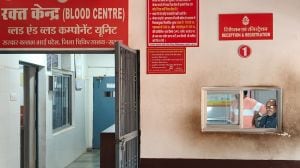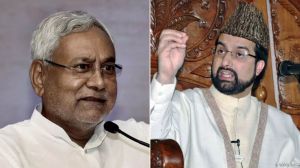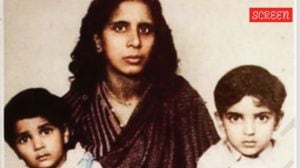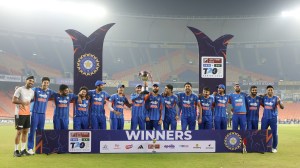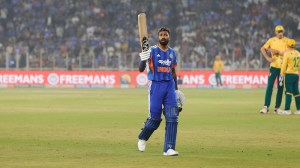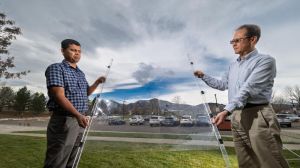While I am currently pursuing my Master’s in Human Centered Computing (HCC) at the University of Maryland, Baltimore County, my journey to the US has not been an easy one. My life went from leaving an engineering degree in mid, to getting accepted at six American universities.
I completed my schooling from The Oxford English School (ICSE and ISC), Bengaluru in 2017 with an average percentage. After completing my Class 12 in Science stream, I took up computer science engineering and enrolled at a good engineering college in Bengaluru based on my entrance exam (KCET) rank.
However, it was toward the end of my third semester of engineering when I realised that the degree was not challenging me enough. Since I have been into coding since Class 6, programming no longer fascinates me. At the age of 20, I realised I am a creative person and I value the humanistic side of my life more than lines of code and restricted thinking.
With this in mind, I decided to drop out of regular college without a concrete plan and got myself enrolled in IGNOU’s BA Psychology programme. I took this step in March 2019 to buy some time till I figure out the next steps. I chalked out my plans and enrolled myself in a regular Arts college by the end of the year.
A few months later, Covid lockdown happened and classes switched to the online mode, my plans of enrolling into a regular college didn’t make sense anymore. On top of this, since it was the pandemic, my degree exams were continuously getting postponed, which added a lot of ambiguity in my life.
Why is IGNOU degree not valid in the US?
It’s quite uncommon for a student who earned their Bachelor’s degree through distance education to pursue studies abroad. It’s a non-traditional path, and I had no clear examples to follow. I had to carve my own way forward from the ground up.
Story continues below this ad
Since I earned a three year degree, most of the universities in the US do not recognise it. My first task was to mitigate this effect. Through online research and after going through YouTube videos and study abroad blogs, I discovered World Education Services (WES) — credential evaluation services — which is used by many study abroad aspirants to evaluate their Indian degrees to a global standard. WES’ website stated that “WES recognizes some three-year bachelor’s degrees from India as equivalent to a U.S. bachelor’s degree when the following conditions are met: The degrees have been earned in Division I (a classification that indicates a student’s academic performance) and The awarding institutions have been accredited by India’s National Assessment and Accreditation Council (NAAC) with a grade of “A” or better”.
Typically, a US bachelor’s degree comprises 120 credits over four years. In contrast, a three-year degree in India usually consists of 90 to 96 credits, although there are some exceptions. The number of credits can significantly influence the assessment of whether our three year degrees can be considered equivalent to a four-year US Bachelor’s degree. Fortunately, my programme exceeded 120 credits, and additional factors, such as IGNOU’s NAAC A++ accreditation and earning a degree in Division I (above 70 per cent) played a pivotal role in determining my outcome.
I faced many administrative challenges with IGNOU as Covid restrictions brought in a lot of ambiguity within the university. After a lot of back and forth with my regional centre, I was able to get my degree certificate and marksheet eight months post graduation. Also, during the Covid lockdown, while I was waiting for my degree to be issued, I found a fault in the grading system at my university (a simple typo in the curriculum PDF), which helped 20 people get their degree certificates on time.
Other than a degree, we are also required to submit Letter of Recommendations (LoRs) for our US college applications. However, LoRs from a distance education university at the Bachelor’s level is impossible to get, as we wouldn’t have a professor-student relationship established to ask for a recommendation, and I had to completely rely on work related LoRs.
Story continues below this ad
Living away from home
I got admission in University of Maryland and the first two weeks in the US were quite challenging. I was busy signing the lease for my apartment, figuring out groceries, unpacking, and attending university meet-and-greet events. It was exhausting, but I wouldn’t want it any other way.
Learning to live independently and handle conflicts with roommates proved to be valuable skills, though it was tough at first. Fortunately, since many Gen Z and millennial students from India are familiar with Western culture, I didn’t experience much culture shock.
One of my favourite moments happened while I was solo travelling in St Michael’s, Maryland. It was my first time visiting a vintage car museum, and the lady at the reception was incredibly friendly. She started a conversation, and we ended up chatting for about 30 minutes. We exchanged web series recommendations and talked about travel and serendipity. I have observed that striking up small talk is much easier here, which helps me connect with people and feel more a part of the community.
Each day presents a new opportunity for learning and growth. The classes here foster collaboration, encouraging us to cultivate innovative ideas and diverse perspectives. In contrast, the Indian education system often emphasises diligence and the acceptance of routine tasks that, while necessary, can sometimes stifle creativity. The US education system has empowered me to think independently, allowing me to shape my own academic path through a wide array of electives and the ability to select professors whose expertise aligns with my interests.
Story continues below this ad
My typical day begins with a refreshing morning routine, during which I prepare smoothies for breakfast, often followed by meal prep for lunch and dinner. I balance part-time work on campus with attending lectures, and I actively engage in building my personal brand online for professional development. Much of my free time is spent at the university library, where I focus on networking and enhancing my skills beyond the classroom. On Saturdays, I enjoy outings with friends, while Sundays serve as my day to reset and prepare for the week ahead.
(This letter is part of a series by The Indian Express where we bring to you the experiences of students at different foreign universities. From scholarships and loans to food and cultural experiences — students tell us how life is different in those countries and things they are learning other than academics)










